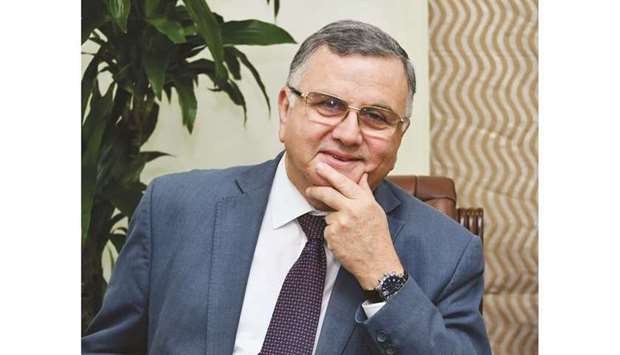An official of the Qatar International Centre for Conciliation and Arbitration (QICCA) has lauded the efforts of Qatar Museums (QM) in promoting the cultural heritage of the country through the staging of a variety of initiatives and events.
QICCA general counsel Dr Minas Khatchadourian, who earlier called for a law protecting Qatar’s cultural heritage, commended the “extremely admirable” and “laudable and meritorious efforts” of Qatar Museums Chairperson HE Sheikha Al Mayassa bint Hamad bin Khalifa al-Thani in organising “an extremely important mission” by creating new museums and awareness about Qatar’s cultural heritage.
The cultural heritage of every county is a valuable part of the cultural heritage of the world as a whole, said Khatchadourian, citing the United Nations Educational, Scientific and Cultural Organisation (Unesco) in a paper titled *Does Qatar need a specific law to protect and preserve its cultural heritage?.
He said the growing recognition of the importance of cultural heritage has resulted in the formation of strengthening of international cultural heritage organisations whose goal involves protection, promotion, management, and dissemination of the cultural heritage.
At the international level, several organisations are involved in the protection and management of the world’s cultural heritage, Khatchadourian said, adding that among the most prominent organisations are Unesco, the International Council of Museums, the International Council on Monuments and Sites, and the International Centre for the Study of the Preservation and Restoration of Cultural Property.
To increase awareness of the country’s cultural heritage, he suggested the conduct of heritage walks, such as strolling along the alleys of Souq Waqif, and holding heritage festivals like Darb Al Saai and horse breeding, among others.
“Heritage walks are examples of convenient ways to create awareness among the public about cultural heritage, with the aim to instil and to endorse awareness about heritage buildings and their conservation,” Khatchadourian said. “A heritage walk not only brings the public closer to past heritage but offers a long way in providing intangible enticements for conservation.”
“It is the best way to educate youth; a heritage walk enables people to obtain knowledge on one’s culture, customs, philosophy, traditions, and rituals,” he added. “It also enables Qataris to recall and remind them about the rich culture and history.”
Khatchadourian said: “When properly prearranged, heritage festivals have the potential to fascinate, exhibit cultural traditions and educate the general public about the rich culture, and at the same time, raise the economic impact on the community.”
The cultural heritage of every county is a valuable part of the cultural heritage of the world as a whole, said Khatchadourian, citing the United Nations Educational, Scientific and Cultural Organisation (Unesco) in a paper titled *Does Qatar need a specific law to protect and preserve its cultural heritage?.
He said the growing recognition of the importance of cultural heritage has resulted in the formation of strengthening of international cultural heritage organisations whose goal involves protection, promotion, management, and dissemination of the cultural heritage.
At the international level, several organisations are involved in the protection and management of the world’s cultural heritage, Khatchadourian said, adding that among the most prominent organisations are Unesco, the International Council of Museums, the International Council on Monuments and Sites, and the International Centre for the Study of the Preservation and Restoration of Cultural Property.
To increase awareness of the country’s cultural heritage, he suggested the conduct of heritage walks, such as strolling along the alleys of Souq Waqif, and holding heritage festivals like Darb Al Saai and horse breeding, among others.
“Heritage walks are examples of convenient ways to create awareness among the public about cultural heritage, with the aim to instil and to endorse awareness about heritage buildings and their conservation,” Khatchadourian said. “A heritage walk not only brings the public closer to past heritage but offers a long way in providing intangible enticements for conservation.”
“It is the best way to educate youth; a heritage walk enables people to obtain knowledge on one’s culture, customs, philosophy, traditions, and rituals,” he added. “It also enables Qataris to recall and remind them about the rich culture and history.”
Khatchadourian said: “When properly prearranged, heritage festivals have the potential to fascinate, exhibit cultural traditions and educate the general public about the rich culture, and at the same time, raise the economic impact on the community.”


